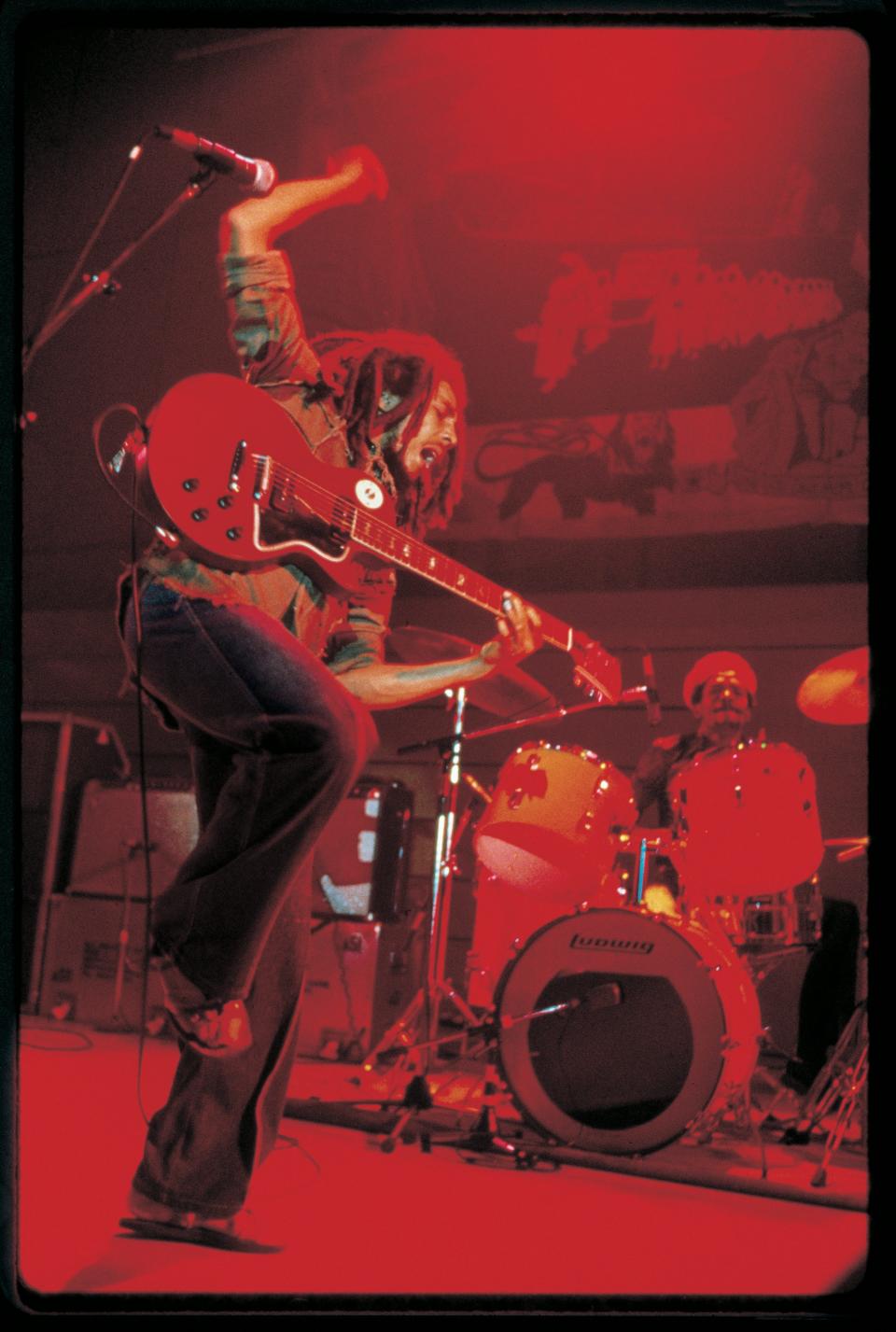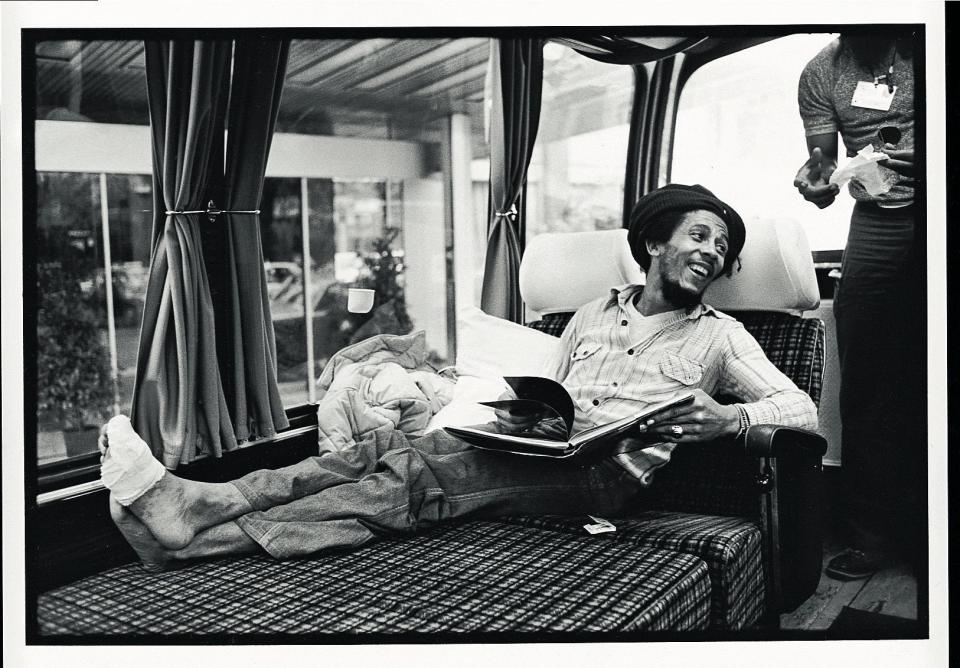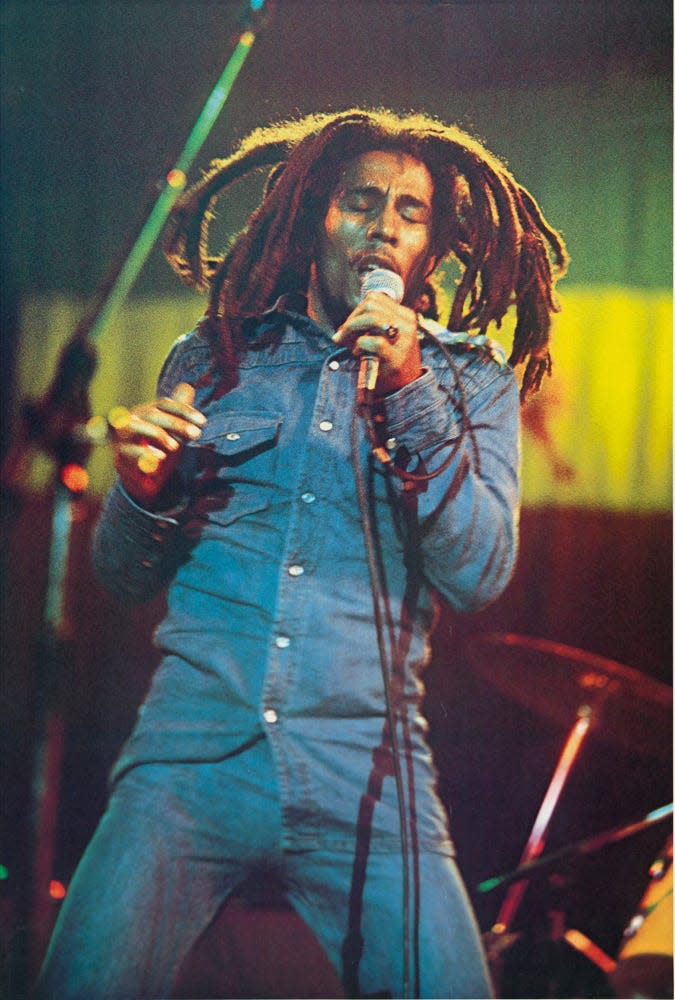Springsteen, Keith Richards pen tributes to Bob Marley in photo book 'Rebel Music'
Kate Simon had a problem. The photographer was working with a subject who never seemed to open his eyes while performing on stage.
So in a mid-20s fearless moment, Simon pulled Bob Marley aside and made her request plain.
“I just said, ‘Bob, help me out,’” recalls Simon. “And suddenly there were times when his eyes were open, especially when he sang that line from the song ‘Exodus,’ which goes ‘Open your eyes and look within.’”
In truth, over the course of around five years as friend and tour photographer, Simon wound up with plenty of shots of a wide-eyed Marley, including the now famous “Kaya” album cover shot of the beaming Rastafarian icon.
Purchases you make through our links may earn us and our publishing partners a commission.
That indelible journey with Marley – who ascended from Jamaican fame to international superstardom between 1975 and his death at age 36 from cancer in 1981 – is the subject of her book “Rebel Music: Bob Marley & Roots Reggae" (out now in bookstores and at marleybook.com; $55, Genesis Publications).
A limited edition and long sold-out version of "Rebel Music" was originally released in 2004, and this broader hard-cover run is aimed to coincide with the 50th anniversary of Marley's seminal album, "Catch A Fire."

The book returns as outlets such as SiriusXM continue to put a spotlight on Marley’s work (with its Tuff Gong reggae channel), and as work continues on a much-anticipated biopic (“Bob Marley: One Love” is due out Feb. 14 starring Kingsley Ben-Adir as the singer).
For Simon, Marley felt especially present to her when she was parsing through her negatives from nearly a half-century ago. His positive empowering energy, she says, is one for our troubled times.
More: From 'Stop Making Sense' to Joan Baez, here are new music movies we can't wait to see
“It’s hard to fully understand why he was so undeniable, but he was,” says Simon, who was a young American photographer living in London when she was made aware of the Jamaican. “His songwriting was extraordinary, and it remains a source of consolation and strength for so many. It’s about one love, but also, standing up for your rights.”

The book features more than 400 photos, some never seen, as well as commentary and tributes from Marley’s friends, band members and other associates, ranging from producer Lee “Scratch” Perry to Marley promoter and Island Records founder Chris Blackwell.
Bruce Springsteen, Keith Richards are among the rock titans who offer tributes to Bob Marley
Some rock heavyweights also weigh in with their written tributes. Keith Richards reminisces about being bowled over by reggae while visiting Jamaica in 1972 during the Rolling Stones’ “Goats Head Soup” sessions. The unique “sense of melody” was something he “never got over.”
Bruce Springsteen suggests that Marley, who Simon says once opened for The Boss at Max’s Kansas City in New York, belongs in a pantheon with Bob Dylan, Elvis Presley, James Brown and Woody Guthrie. “He is one of few musicians who can truly be described as revolutionary,” he writes.

Lenny Kravitz says Marley “gave us the power to get up, stand up,” while singer and poet Patti Smith, another Simon friend and photography subject, asks readers to picture Simon working away with her trusty Nikon F-2 slung around her neck, trying to bring to light “the pain and the glory of (Marley’s) revolutionary dream.”
Looking back on those heady years in Europe – Simon spent the entire 1977 “Exodus” tour traveling with Marley and his merry group, the Wailers – and in Jamaica, the photographer says she had no way of knowing she was chronicling the comet-like burst of a music legend.
“I was serious about what I was doing, as was he,” she says. “We had a good rapport, and he could be deep and sensitive at the same time. But I was just doing my job. There was no way to know that all these years later, he would remain so important."

What was Bob Marley's favorite thing to do when not making music? Play soccer
Simon says her time with Marley revealed he was a diligent leader during rehearsals, insisting on perfection from his band and singers. But during breaks, he would want to cut loose and play soccer with his friends. The relaxed part of Marley came to the fore especially when he was at home in Kingston, where he’d spend time with family and friends.
Her photo of a smiling Marley for that “Kaya” album was taken moments after she had lost a race against record producer Blackwell in the Sheraton pool in Kingston. Perhaps amused by the competition, Marley lit up, and that image now can be found on innumerable T-shirts and buttons around the world.
While Simon had experience photographing other top acts of that day, ranging from the Stones to Queen, she says taking pictures of Marley was unique in that he didn’t seem to care about fame.
Indeed, Simon’s photos include decidedly non-glamorous shots of Marley dozing, practicing guitar and limping off on a bandaged foot.

“You were around someone who wasn’t chatty or a show-off,” she says. “To take a show biz photo of Bob wouldn’t have been appropriate. He didn’t have stylists and image people. He was invested in and serious about his music. That and his religion, they were his message to the world. That’s what he cared about.”
An injured foot leads to a cancer diagnosis that eventually ended Bob Marley's life
That injured foot, as Marley fans know, was the result of a soccer match in Paris where an opposing player stepped on the musician’s foot. It swelled, and never really healed.
The issue, it turned out, was a preexisting melanoma. Marley rejected the doctor’s calls to amputate his toe. Eventually, the cancer spread throughout his body. Marley mounted an ambitious U.S. tour in 1980 with the Commodores, but the disease eventually took his life in May 1981.
Simon was in Kingston for that outpouring of grief, sorrow and reverence. Next to photos of the funeral procession, Simon writes: “I hadn’t looked at these pictures for about 20 years and when I did, it broke my heart.”
This article originally appeared on USA TODAY: 'Rebel Music' features Bob Marley photos and rock hero tributes
